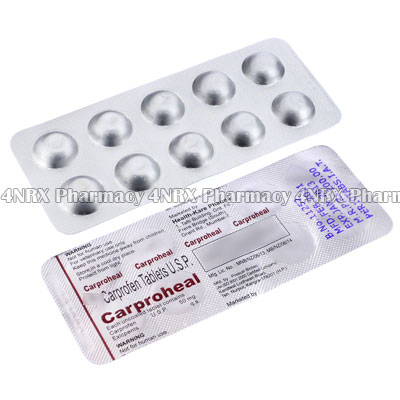 |
Home  4NRX Pet Pharmacy 4NRX Pet Pharmacy  Carproheal (Carprofen) Carproheal (Carprofen) |
|
|||||||||
|
|
Carproheal (Carprofen)
What is Carproheal (Carprofen) used for? Carproheal (Carprofen) is an oral non-steroidal anti-inflammatory drug (NSAID) used to treat elderly dogs with arthritis and deteriorating joints. The medication operates by preventing the release of enzymes that cause pain, irritation, and swelling associated with this condition. This action may also make it useful for reducing inflammation caused by minor injuries or following surgery. Your veterinarian may also prescribe it for other unlisted conditions, as well. How should I use Carproheal (Carprofen)? Strictly follow the directions provided by your veterinarian while using Carproheal (Carprofen) to get the best results from treatment. One tablet is normally given each day, but the best dosage will be determined by your dog's weight, age, current health, and the severity of its symptoms. These should be given orally and may be hidden in a snack or food if you have trouble administering the tablet. Ask your veterinarian any questions you have about the medicine to make sure you are using it correctly. What are the side effects of Carproheal (Carprofen)? The use of Carproheal (Carprofen) may cause side effects in some dogs such as:
Contact your veterinarian immediately if you observe any signs of serious side effects such as tremors, seizures, severe skin rashes, bloody vomit, blood appearing in the diarrhea, or signs of an allergic reaction such as hives, swelling, or trouble breathing. These conditions may require lower doses, reduced administration frequency, or emergency medical assistance in serious cases to prevent further health problems from occurring. Please Note Carproheal (Carprofen) is only suitable for use in dogs and should not be used by humans or to treat other types of animals. You are also suggested to inform your veterinarian about any other chronic health conditions your dog has to make sure any necessary adjustments are made to its treatment to prevent more health problems from occurring. Strictly follow all instructions provided to you by the prescribing vet while administering Carproheal (Carprofen) to your dog. Optimum and safe dosage can differ based on the dog and the condition it is being treated for. As this medication may be unsafe for certain dogs, it is essential you always inform the vet if your dog is used for breeding and is pregnant or lactating, as well as if it has any allergies, other illnesses, or ongoing health conditions, and if it is being given any other form of medication, supplements, or herbal products. Immediately seek emergency veterinary care if your dog has any allergic or hypersensitive reaction. Common signs of a reaction in dogs include hives, swelling, skin rashes, chest pains, as well as trouble breathing or swallowing. 

|
||||||||||||||||||||||